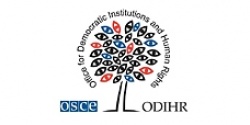Published: 02.10.2013

During the Human Dimension Implementation Meeting organised by the Organisation for Security and Co-operation in Europe, the Ordo Juris Law Centre has organized on 30th September a meeting on the current threats to freedom of speech in Poland.
The main topic of discussion was the amendment to the Polish anti-discrimination law. The new anti-discrimination bill, wrongly presented as proper fulfillment of EU antidiscrimination directives, will seriously diminish freedom of speech in Poland.
Jerzy Kwasniewski Attorney in law, on behalf of the Ordo Iuris, presented the details of the proposed statutory solutions. Unsuitable for the evaluation of  media content, a very broad definition of harassment will lead to significant restriction of the freedom of expression and the media. The media and journalists are likely to be targeted for financial claims, not only as financial compensation of an economic loss (which is already available, though seldom occurring) but also because of personal discomfort suffered from actions considered by the affected, as discriminatory. Dislocation of the burden of proof requires the alleged victim of unequal treatment only to show probability of the alleged harassment, whereas accused journalist and/or editors will have to prove that they did not committed any unwanted conduct violating the dignity of an accusing them person, by creating an intimidating, hostile, degrading, humiliating or offensive environment (harassment). This will result in preventive censorship, which also affect the scientific community.
media content, a very broad definition of harassment will lead to significant restriction of the freedom of expression and the media. The media and journalists are likely to be targeted for financial claims, not only as financial compensation of an economic loss (which is already available, though seldom occurring) but also because of personal discomfort suffered from actions considered by the affected, as discriminatory. Dislocation of the burden of proof requires the alleged victim of unequal treatment only to show probability of the alleged harassment, whereas accused journalist and/or editors will have to prove that they did not committed any unwanted conduct violating the dignity of an accusing them person, by creating an intimidating, hostile, degrading, humiliating or offensive environment (harassment). This will result in preventive censorship, which also affect the scientific community.
The next speaker, psychologist Bogna Białecka has referred to famous Mark Regnerus case. In her oppinion, enacting of the amendment will lead to blocking freedom of conducting research and disseminating its effects. Bogna Białecka expressed her strong conviction, that the draft amendment in question enhances favorable treatment of LGBT life styles, especially by means of the prohibition of discrimination based on gender identity and expression.
Basing on data provided by LGBT organizations to EU Fundamental Rights Agency, as to the frequency of discriminatory practices in Poland, Bogna Białecka estimated the possible number of new lawsuits based on the proposed antidiscrimination provisions. According to the data it is to be expected, that about four hundreds of thousands of potential lawsuits for discrimination and harassment will rise, providing the amendment will be accepted.
In concluding remarks by the Prof. Aleksander Stępkowski - the Ordo Iuris Director, current state of legislative proceeding leading to enactment of the bill, was presented. Parliament has already voted twice the project, each time in a favorable way for the bill. In the near future the project will be discussed by the Committee on Justice and Human Rights.

Will Poland’s Law and Justice (PiS) go down the same path as Western Europe’s Center Right?

A considerable portion of the public which can be generally described as liberal accepts the decision by Warsaw Mayor Rafał Trzaskowski to remove religious symbols from Warsaw offices as uncontroversial.

- According to polls, a majority of Poles support an increased legal availability of prenatal killing than the public has access to at present. This support fluctuates, however, depending on how a poll’s questions are formulated.

- Spanish authorities have banned public prayer, including the recitation of the rosary for the homeland. The decision is in response to mass protests by the population expressing opposition to the amnesty of Catalan separatists.
- States, by introducing legislation criminalising silent prayer, are violating the right to freedom of thought and conscience, which is a fundamental human right.